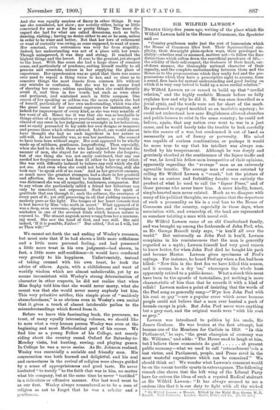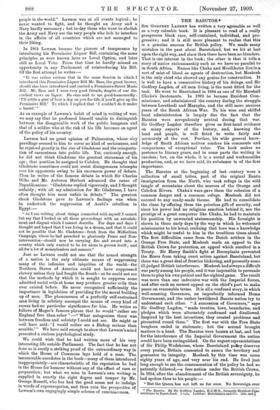SIR WILFRID LAWSON.*
NEARLY thirty-five years ago, writing of the place which Sir Wilfrid Lawson held in the House of Commons, the Spectator said :— " Country gentlemen make just the sort of humourists which the House of Commons likes best. Their Squirearchical sim- plicity, their downright plain-spoken ways, their privileged in- ability—whether real or assumed, matters not—to follow the finer distinctions which soften down the superficial paradoxes of life,— the solidity of their self-respect, the bonhomie of their frank, out- of-doors manner, the thoroughly national character of their sagacity, and the complete understanding between them and• the House as to the prepossessions which they really feel and the pre- possessions which they have a prescriptive right to assume, form a sound, firm basis for mutual understanding and good feeling on which it is very easy indeed to build up a more cordial relation."
Sir Wilfrid Lawson ne :er ceased to build up that " cordial relation," and the highly readable Memoir before us fully
explains how and why he did it. He was once described is a jovial cynic, and the words were not far short of the mark. He professed to regard mankind as an insoluble mystery ; he could not understand how sane Englishmen allowed churches and public-houses to exist in the same country ; he could not believe, again, that any nation ever went to war in a just cause, and he would barely take the trouble to look carefully into the causes of a war, but condemned it out of hand as necessarily an act of frenzy or perversity. His mind was capable of curious combinations, or perhaps it would be more true to say that his intellect was always con- trolled by his temperament. Although he was deeply and genuinely shocked at the continuance of the liquor traffic and of war, he loved his fellow-men irrespective of their opinions, apparently regarding the " average " man as an extremely agreeable lunatic. The average man of course retorted by calling Sir Wilfrid Lawson a " crank," but the picture of him as an austere and forbidding fanatic was entirely the product of what he used to call the " liquor Press," and of those persons who never knew him. A more kindly, honest, simple-hearted man never existed. Much as we disagree with many of his political thoughts, we recognise that the departure of such a personality as his is a real loss to the House of Commons and the country, especially in these days, when association with, and ownership of, the land are represented as somehow tainting a man with moral evil.
Sir Wilfrid Lawson came of an old Cumberland family, and was brought up among the foxhounds of John Peel, who, as Mr. George Russell truly says, " is ken'd all over the world." But universally as John Peel is ken'd, Lawson complains in his reminiscences that the man is generally regarded as a myth ; Lawson himself had very good reason to know better, for when John Peel died he bought his pack and became Master. Lawson gives specimens of Peel's
sayings. For instance, he heard Peel say when a fox had been killed "Now this is the first fox we have killed this season, and it munna be a dry 'un," whereupon the whole hunt apparently retired to a public-house. What a shock this, must have been to the apostle of teetotalism, yet nothing is more characteristic of him than that he records it with a kind of relish ! Lawson makes a point of insisting that the words Of the Peel song as generally sung—"D'ye ken John Peel with his coat so gay "—are a popular error which arose because people could not believe that a man ever hunted a pack of hounds except in pink. But John Peel never wore anything
but a grey coat, and the original words were " with his coat so grey."
Lawson was introduced to politics by his uncle, Sir James Graham. He was beaten at the first attempt, but became one of the Members for Carlisle in 1859. " In this Parliament," he says, "the great champion of economy was Mr. Williams," and adds " The House used to laugh at him,
but I believe these economists do good at present public economy—what we used to call retrenchinent '—is a lost virtue, and Parliament, people, and Press revel in the most wasteful expenditure which can be conceived"" We should think so ! We wonder what Lawson's comment would be on the recent terrific spurts in extravagance. The following remark also shows that the left wing of the Liberal Party have far outrun the ideas of such a reputed Radical stalwart as Sir Wilfrid Lawson : "It has always seemed to me a curious idea that it is our duty to fight with all the wicked • Sir Wilfrid Lawson a Memoir. Edited by the Right Hon. George W. E, Russell. With Portraits. London : Smith, Elder, and Co. [7s. Cx1. net.]
people in the world." Lawson was at all events logical ; he never wanted to fight, and he thought an Army and a Navyhardly necessary; but todity those who want to abolish the Army and Navy are the very people who itch to interfere in the affairs of all countries which are not managed to their liking.
In 1864 Lawson became the pioneer of temperance by introducing his Permissive Liquor Bill, containing the same principles as were known later as Local Option, and later still as Local Veto. From that time he hardly missed an opportunity in any Parliament of reintroducing his Bill. Of the first attempt he writes:— "It was rather curious that in the same Session in which I introduced this Permissive Liquor Bill Mr. Bass, the great brewer, should also have introduced and carried a Permissive Street Music Bill. Mr. Bass and I were very good friends, despite of our dis- cordant views on liquor. He once said to me good-humouredly : settle a pint of beer a day on you for life, if you'll give up the Permissive Bill.' To which I replied that I couldn't do it under a barrel.' "
As an example of Lawson's habit of mind in writing of war, we may say that he professed himself unable to distinguish between the disagreeable work of the public hangman and that of a soldier who at the risk of his life becomes an agent of the policy of his country.
Lawson had no great opinion of Palmerston, whose airy persiflage seemed to him to cover no kind of seriousness, and he rejoiced greatly in the rise of Gladstone and the reimporta- tion of earnestness into public life. Yet, curiously enough, he did not think Gladstone the greatest statesman of his age; that position he assigned to Cobden. He thought that Gladstone sometimes could not resist disingenuous triumphs over his opponents owing to his enormous power of debate. Thus he writes of the famous debate in which Sir Charles Dilke and Mr. Auberon Herbert advanced the cause of Republicanism: "Gladstone replied vigorously, and I thought unfairly; with all my admiration for Mr. Gladstone, I have often thought him most unfair in debate." The greatest shock Gladstone gave to Lawson's feelings was when he undertook the suppression of Arabi's rebellion in Egypt :—
"As I am writing about things connected with myself I cannot but say that I looked on all these proceedings with an astonish- ment and disgust which I cannot describe. For days and days I thought and hoped that I was living in a dream, and that it could not be possible that Mr. Gladstone—fresh from the Midlothian Campaign, where he had preached so gloriously Peace and Non- intervention—should now be carrying fire and sword into a country which only wanted to be let alone to govern itself ; and all for a lot of moneylenders and usurers."
Just as Lawson could not see that the armed strength of a nation is the only ultimate means of suppressing many of the infamies and iniquities of the world—the Northern States of America could not have suppressed slavery unless they had fought the South—so he could not see that the methods by which it is sought to suppress some admitted social evils at home may produce greater evils than ever existed before. He never recognised sufficiently the importance in legislation of providing for the moral building up of men. The phenomenon of a perfectly self-restrained man living in sobriety amongst the means of every kind of excess had-no particular significance for him. He writes as follows of Magee's famous phrase that he would " rather see England free than sober " :—" What antagonism there was between freedom and sobriety I could not see. He might as well have said : I would rather see a Bishop serious than sensible." We have said enough to show that Lawson's mind presented a curious psychological study.
We could wish that he had written more of his very interesting life outside Parliament. The fact that he has not done so is surely a striking proof of the extraordinary way in which the House of Commons lays hold of a man. The innumerable anecdotes in the book—many of them introduced inappropriately—are characteristic of the reputation he had in the House for humour without any of the effect of care or preparation; but what we miss in Lawson's own writing is supplied in exactly the right degree and temper by Mr. George Russell, who has had the good sense not to indulge in words of supererogation, and thus ruin the perspective of Lawson's own engagingly simple scheme of reminiscences.















































 Previous page
Previous page